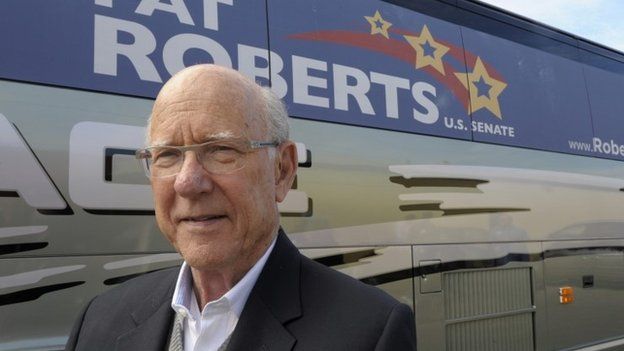Mid-term elections: Greg Orman upends Kansas politics
- Published

Kansas is one of the most consistently Republican states in America, electing only two Democrats to the Senate in its history. But a millionaire businessman running as an independent this year has upended the state's political calculus - and could have an impact far beyond its borders.
Kansas is conservative. The birthplace of Dwight Eisenhower is careful about change.
Like the flat landscape that does not rise or dip for mile after mile, the state's habits are settled. Republicans win and Democrats lose, and on the Election Night map Kansas always turns red.
So why is Pat Roberts, three-term senator, struggling so hard, looking so desperate, and pulling in Republican colleagues from across the country to help him save his seat?
In an election where the Republicans have been predicting for months that they can supplant the Democrats in the Senate, this is a problem that was unexpected.
Yet Mr Roberts told me in Topeka that "the road to a Republican majority in the Senate runs right through Kansas" - and he's right.
The reason is that he and his party have been shaken by an unusual campaign by an unorthodox figure, a multi-millionaire called Greg Orman, who is running at them hard.
One recent poll had him ahead and everyone expects the Kansas race to be close.
Mr Roberts himself is now breaking one of the laws of electoral politics and admitting in his speeches that he needs every vote to survive.
He is 78 and looking every year of it.
His is an odd predicament. The Republican governor, Sam Brownback, has introduced the kind of radical tax cuts that hard-line tea party conservative activists have been arguing for, but they have turned out to be deeply unpopular.
And now Mr Roberts is having to cope, not with a Democrat, but with that more awkward beast, an independent.
Mr Orman is a businessman whose career has its blemishes, and whose campaign is conducted in lofty style.
He does few public meetings, preferring video messages, and yet he could win.
He insists that if he is elected, neither party can take his vote for granted in the Senate. But to the consternation of Republicans, his pitch is popular.
The question beyond the borders of Kansas is whether Mr Orman's campaign - especially if it turns out to be successful - is a harbinger of more to come. Forget a third party, or a rush of independents running for House and Senate seats, because that is not going to happen.
But the way may be open for determined individuals to force themselves on to the Washington stage in a way that has not happened in the modern era. The grip of the party machines would slacken even more.
If Mr Orman is elected, you can bet it will be the talk of Capitol Hill. Like Angus King from Maine and Bernie Saunders from Vermont, both elected as independents, he would be a senator who promised no consistent party allegiance and won because of it.
The history of Kansas makes this story sing, because the state has been consistent, only voting for Democrats for president three times since World War One (Franklin Roosevelt - twice - and Lyndon Johnson). and it exudes continuity.
If you visit the showground for the American Royal, one of the four big livestock shows in the country, you see the cattle paraded as they have been for generations. Farming has changed, but these traditions remain.
The long trains roll past and the mooing of the cows follows them down the track. The cowboys, from Wyoming and Colorado as well as Kansas, tie up their cattle for the night and drink shots at the bar.
Signs on the doors to the showground remind them that weapons are prohibited inside, whether concealed or not. Nothing changes here.
Out at Kansas State University, one graduate student, Brion Bircher, tells me that he and some of his colleagues are intrigued by Mr Orman's campaign and wonder whether this might be a sign of the change that Mr Obama promised in 2008 but has found so difficult to bring to Washington.
He is tempted to think that we may see many more of these campaigns.
But his political science professor, Nate Birkbeck, says he reminds his students that outsiders have regularly gate-crashed politics before.
In the end, the two parties have always absorbed them. Isn't it likely that it will happen again?
US midterms 2014: Where does all the money come from? (Video by David Botti)
I tell Mr Birkbeck of a nice sighting on the road out from Kansas City that morning - a rainbow, dropping straight down from the clouds. We were not far from the Wizard of Oz museum when we saw it. A story almost too good to be true.
Was the professor saying that Greg Orman was sending us down the yellow brick road - only to find nothing there?
He would not go that far, but he retained his scepticism. Maybe he is right.
But on these plains, where they are used to tornadoes, there is a storm brewing. If Pat Roberts holds on, it will be thanks to voting habits that will not die, some hardball advertising, and a rescue campaign from worried Republicans in Washington.
But if he falls, it will not just be an intriguing piece of the arithmetic to work out control of the Senate.
A bell will ring, and it may be heard far beyond the borders of Kansas.